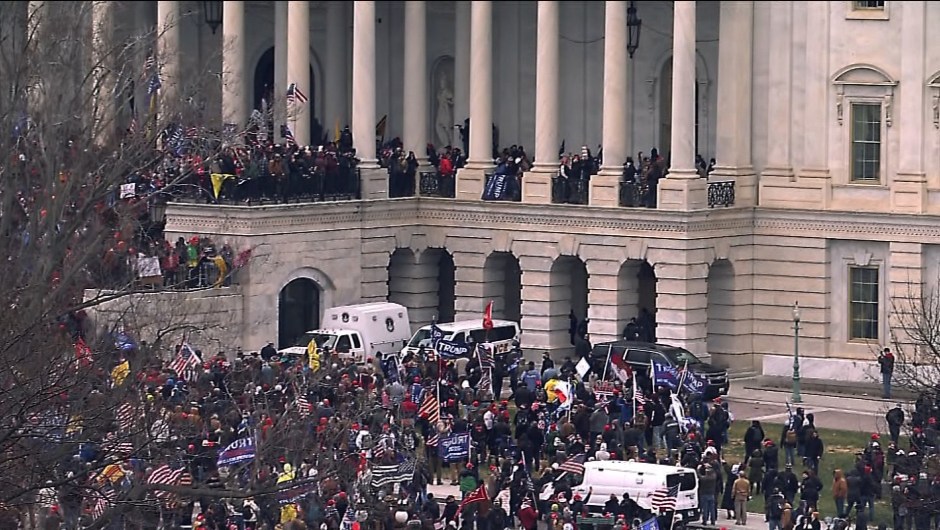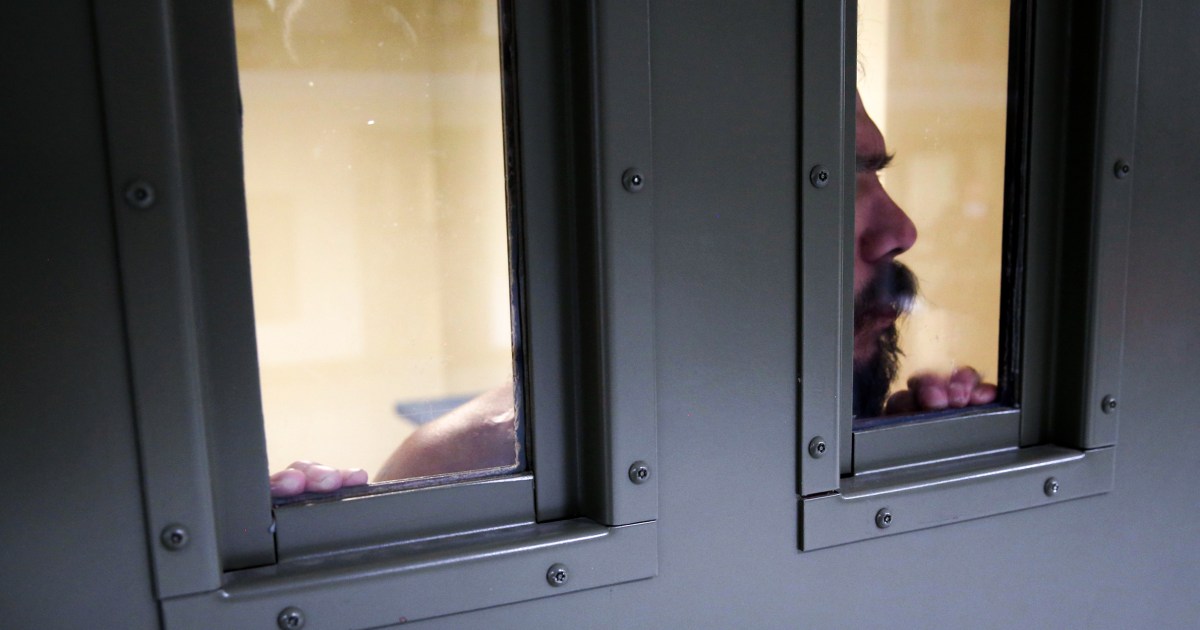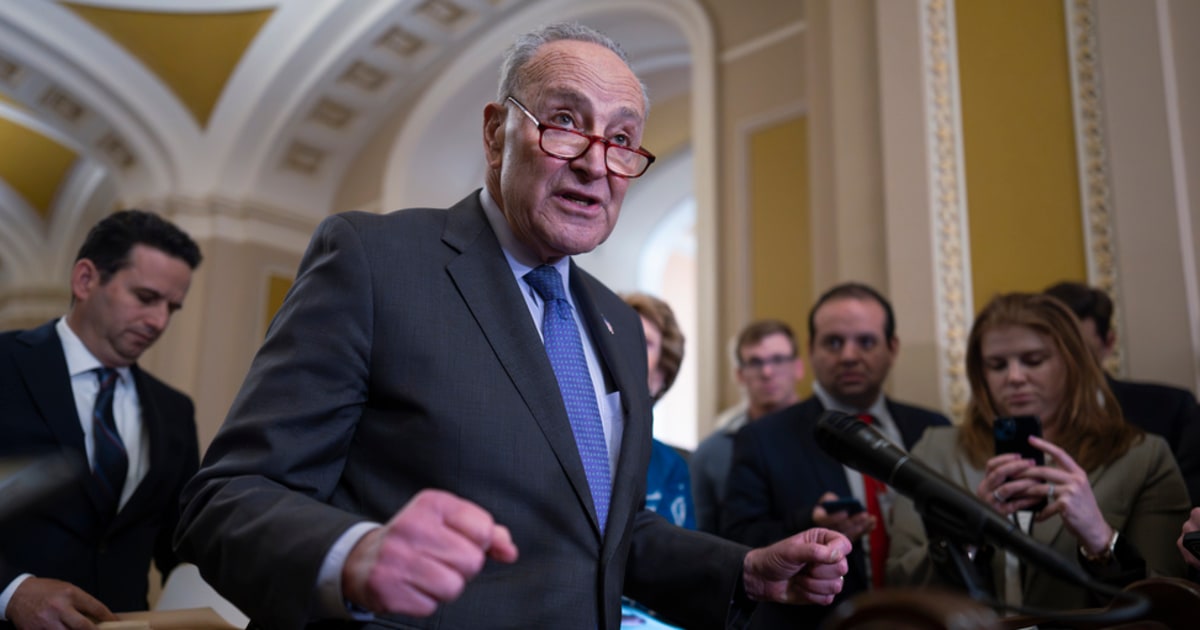The big lies about the assault on the Capitol on January 6 3:21
(CNN) -
If January 6, 2021 were just an infamous day, its stain on American history would still reverberate through generations.
But the assault on the United States Capitol was far from a day of autonomous fury. It was both the culmination of the rule of an aberrant and demagogic president and the catalyst for the longest onslaught against the American democratic system in decades. He legitimized violence as a tool for political expression among millions of citizens and raised the disturbing possibility that, as horrible as that day was, it may only be a preview of a deeper democratic breakdown to come.
The aftermath of hours of terror provoked by Donald Trump inciting a mob to "fight like hell" to deny the will of the voters revealed that much of the Republican Party had rejected the principle of an expansive and unified democracy by which its first President, Abraham Lincoln, had died.
Far from destroying the mythology of Trumpism, Republicans climbed onto the metaphorical rubble of the Capitol to launch a nationwide voter suppression scheme that could facilitate the theft of future elections without the need for an angry mob to storm the Capitol.
Biden Points to Trump on Capitol Attack Anniversary: Can't Accept He Lost
1 of 35
|
Pro-Trump protesters pushed through barriers along the perimeter of the Capitol building, clashing with police, the full riot gear, and some calling the officers "traitors" for doing their jobs.
Look here some of the most impressive images of that day.
2 of 35
|
The protesters pushed the metal fences and the police.
They also used the fences to push the protesters back.
(Credit: SAUL LOEB / AFP via Getty Images)
3 of 35
|
Police officers were seen leaning over metal fences to beat people trying to cross them.
(Credit: SAUL LOEB / AFP via Getty Images)
4 of 35
|
The session to count and certify Electoral College votes for president and vice president was suspended.
This photo shows Senators Chuck Schumer and Mitch McConell before the suspension.
(Credit: KEVIN DIETSCH / POOL / AFP via Getty Images)
5 of 35
|
A Capitol police officer confronts a horde of pro-Trump protesters as they entered the Capitol on January 6, 2021. The protesters broke through security barriers and entered Congress debating the certification of electoral votes.
(Credit: SAUL LOEB / AFP via Getty Images)
6 of 35
|
An agitator enters the Senate compound and sits on the main podium.
(Credit: Igor Bobic / Huffington Post)
7 of 35
|
Security agents point their weapons at a door that was vandalized in the House of Representatives, during the session to certify the electoral votes of President Joe Biden.
(Credit: Drew Angerer / Getty Images)
8 of 35
|
A crowd of Trump supporters gather outside the Capitol, as seen from inside the building, on the afternoon of January 6, 2021 in Washington.
(Credit: Cheriss May / Getty Images)
9 of 35
|
This was the situation in the Capitol on January 6 in the afternoon, when protesters stormed the premises of Congress and confronted the police.
There was tear gas.
(Credit: SAUL LOEB / AFP via Getty Images)
10 of 35
|
A Capitol police officer wears a gas mask during armed protesters' rampage into Congress.
(Credit: SAUL LOEB / AFP via Getty Images)
11 of 35
|
A protester is seen hanging from the balcony of the Senate Chamber amid riots at the Capitol.
(Credit: Win McNamee / Getty Images)
12 of 35
|
Capitol police officers detained several protesters outside the House of Representatives after they stormed a joint session of Congress on January 6, 2021 in Washington protesting Biden's victory.
(Credit: Drew Angerer / Getty Images)
13 of 35
|
Some people in Congress use plastic bags as armed protesters stormed the joint session of Congress to ratify Biden's victory as president.
(Credit: Drew Angerer / Getty Images)
14 of 35
|
A man sat on the main Senate podium as the Capitol was closed and police tried to contain the escalation of protests.
(Credit: Win McNamee / Getty Images)
15 of 35
|
Outside the Capitol, pro-Trump protesters continued their protest to prevent the victory of President-elect Joe Biden from being certified.
(Credit: Tasos Katopodis / Getty Images)
16 of 35
|
Police throw water at protesters who clashed to try to enter the Capitol in Washington.
(Credit: JOSEPH PREZIOSO / AFP via Getty Images)
17 of 35
|
Protesters enter the United States Capitol building on January 6, 2021 in Washington.
(Credit: Win McNamee / Getty Images)
18 of 35
|
(Credit: SAUL LOEB / AFP via Getty Images)
19 of 35
|
Supporters of US President Donald Trump protest in the Capitol Rotunda on January 6, 2021. (Credit: SAUL LOEB / AFP via Getty Images)
20 of 35
|
Demonstrators protest outside the United States Capitol in Washington, after rioters stormed the Congress building.
(Credit: Samuel Corum / Getty Images)
21 of 35
|
Trump supporters clash with police and security forces outside the Capitol in Washington on January 6, 2021. (Credit: JOSEPH PREZIOSO / AFP via Getty Images)
22 of 35
|
Pro-Trump protesters broke through security and entered the Capitol as Congress debated Electoral College certification.
(Credit: ALEX EDELMAN / AFP via Getty Images)
23 of 35
| Crowds gather outside the United States Capitol on January 6 amid clashes with police. (Credit: ROBERTO SCHMIDT / AFP via Getty Images)
24 of 35
| A Capitol police officer looks out of a broken window as protesters gather at the building on January 6, 2021 in Washington. (Credit: Tasos Katopodis / Getty Images)
25 of 35
| Pro-Trump protesters gather outside the US Capitol building. (Credit: Tasos Katopodis / Getty Images)
26 of 35
| The image shows the deployment of tear gas as pro-Trump protesters enter the United States Capitol on January 6, 2021. (Credit: Tasos Katopodis / Getty Images)
27 of 35
|
Trump supporters try to break through a police barrier in front of the Capitol.
(Credit: John Minchillo / AP)
28 of 35
|
One of the most recognizable figures in the crowd was a man in his 30s with a painted face, a fur hat and a horned helmet.
The protester, Jake Angeli - known to his followers as the Shaman of QAnon - quickly became a symbol of the strange and terrifying spectacle.
(Credit: Win McNamee / Getty Images)
29 of 35
|
A Trump supporter carries a Confederate battle flag in the Capitol Rotunda.
During the Civil War, the closest any insurgent carrying a Confederate flag got to the Capitol was about 10 kilometers, during the Battle of Fort Stevens in 1864. (Credit: Saul Loeb / AFP / Getty Images)
30 of 35
|
Trump supporters try to break through a police barrier.
(Credit: John Minchillo / AP)
31 of 35
|
US Representative Jason Crow, D-Colorado, comforts US Representative Susan Wild, D-Pennsylvania, as she takes cover in the House of Representatives.
(Credit: Tom Williams / CQ-Roll Call, Inc via Getty Images)
32 of 35
|
Richard "Bigo" Barnett, leader of a pro-gun group in Gravette, Arkansas, sits in the office of House Speaker Nancy Pelosi.
(Credit: Saul Loeb / AFP / Getty Images)
33 of 35
|
Law enforcement officers point their weapons at a vandalized door in the House of Representatives after the assault on the Capitol.
(Credit: J. Scott Applewhite / AP)
34 of 35
|
Trump supporters participate in a rally near the White House.
(Credit: John Minchillo / AP)
35 of 35
| Vice President Mike Pence and House Speaker Nancy Pelosi officiate the joint session of Congress early on January 6. Congress was in session to count and certify Electoral College votes before the Capitol was stormed. (Credit: J. Scott Applewhite / Pool / AFP / Getty Images)
A year later, the assault on the Capitol, which interrupted nearly two and a half centuries of peaceful handovers of power, is one of those dates whose notoriety allows it to stand out on its own.
If September 11, 2001 was the day he destroyed an old illusion that underpinned America's power, that the continent was immune from outside attack, January 6 brought an epiphany that democracy cannot really be for forever.
It revealed that the authoritarian forces that preoccupied the founders, and that have since simmered in American civil society, are unleashed.
"We came dangerously close to losing our democracy," Rep. Bennie Thompson, a Mississippi Democrat who heads the House commission investigating the insurrection, told CNN.
advertising
January 6 had a turn of events that is still shocking
Trump, his Republican henchmen, and the conservative media have spewed so much disinformation and propaganda that it is worth dwelling on what actually unfolded before the eyes of the world.
The House committee, offering the best shot at a historical record of that day, seems to be getting closer and closer to uncovering what happened behind the scenes at the White House.
But it began with a president whose explosive ego and disregard for constitutional guarantees made it impossible for him to admit defeat and who falsely claimed victory in the 2020 elections.
But weeks of lies, ridiculous cases without evidence and attempts to coerce local leaders into following the deception of a second term, failed.
At the time, most people did not know about the crazy ploy to subvert Electoral College results that Trump hoped to use to convince then-Vice President Mike Pence to make him win the Congressional election.
When all else had failed, Trump summoned his supporters to a rally in Washington that he prepared with extremist fantasies of electoral fraud, the same day that Congress, under Pence's jurisdiction, was to certify Joe Biden's electoral victory in 2020. .
"If you don't fight like a devil, we are not going to have a country," he told a crowd maddened by his poison.
"We're going to try to give our Republicans ... the kind of pride and fearlessness they need to take back our country. So let's walk down Pennsylvania Avenue."
Of course, Trump did not put himself in danger.
He withdrew to the safety of the White House to watch the chaos unfold on television as his supporters invaded the platform awaiting Biden's inauguration later that month and smashed doors and windows in one of the most vile scenes ever witnessed. under the dome of the Capitol.
For three hours, according to new evidence from the Jan.6 commission, Trump refused to calm the violent crowd that beat up cops, demanded Pence's hanging, sent lawmakers running for their lives, and desecrated the symbols of the democratic government in the House and Senate. If it weren't for the heroes of law enforcement agencies, some of the nation's top elected leaders might have perished. As things stood, the violence led to five deaths, including Trump supporter Ashli Babbitt, shot by a Capitol police officer as she tried to invade the Speaker's Hall, after being lured to Washington by her leader's lies.
Even a year later, it is hard to believe that all of this happened in the United States, which for so long was a democratic beacon to the world.
For any other American president, at any other time, such a dereliction of duty in failing to defend the US government from attack would have meant immediate political oblivion.
The reality that Trump may be an even more powerful figure in the Republican Party is now history since January 6.
The Capitol cop who killed Ashli Babbitt on January 6 speaks publicly for the first time: "I know I saved countless lives that day."
Trump supporters now deny assault on Capitol 4:44
The ambition and self-preservation of the Republican Party
When minority leader Kevin McCarthy rose in the House a few days later to say that the then-president "bears responsibility for Wednesday's attack on Congress by the agitators," it seemed for a fleeting moment that the Republican Party finally he would free himself from the yoke of Trump.
Yet three weeks after the riots, the California Republican appeared at Mar-a-Lago, Trump's Florida retreat, smiling for a camera alongside the insurrectionary-in-chief.
His visit rehabilitated the disgraced former president as a political force and effectively put his party's hopes of regaining the House in November 2022 in his hands.
McCarthy was not the only senior Republican to renounce his heresy en route to the midterm elections. Trump's golf partner, Republican Senator Lindsey Graham of South Carolina, said of Trump's attempt to steal the election: "Enough is enough" and "you can count on me." But a year later, he's back as Trump's cheerleader. And in the Senate, all but seven Republicans voted to acquit Trump of the riots at his second impeachment trial, when a conviction likely would have barred him from future federal office. Some argued that as a former president he could no longer do any harm, a position of great naivety or, more likely, of political calculation.
The Republican Party's continued loyalty to Trump despite the horror of January 6 is the act of a party driven by "an instinct for self-preservation and self-progress that turned into a campaign to normalize and excuse the insurrection," said John Mark Hansen, professor of political science at the University of Chicago. Or as Graham said about Trump: "If you try to kick him out of the Republican Party, half the people will leave."
Even stripped of his megaphone on social media, Trump's power over his supporters is almost supernatural and sustained by a conservative, lie-peddling media industry that has rewritten the January 6 story for its viewers. While Trump's protection by the Republican Party has kept his impunity intact, foot soldiers from his attempted coup on Capitol Hill are beginning to receive jail terms.
Only 27% of Republicans in a recent Washington Post / University of Maryland poll said Trump bears a "big chunk" or a "good amount" to blame for Jan. 6. In the same poll, 69% of Trump voters said that Biden was not legitimately elected in 2020, the lie at the heart of the insurrection. Amplifying that falsehood is the entry price for the 2022 Republican candidates who want the support of the former president. And it can still fuel a Trump presidential bid in 2024. Such misinformation ultimately threatens democracy itself, as many Trump supporters now believe that elections are inherently corrupt and that any Democratic victory is illegitimate.
Ruth Ben-Ghiat, a history professor and author of "Strongmen," a book about heads of state destroying or damaging democracy, said the insurrection would have been impossible without Trump's cult of personality.
"The whole big lie was extraordinary. It was an operation by an authoritarian leader to keep him in power," Ben-Ghiat said.
"But the amazing thing is that everyone agrees. Now millions of people believe it. And he has turned the party into a personal tool."
Given Trump's instincts and track record, he is unlikely to use that power in the national interest.
OPINION |
The Jan. 6 interim report on the Capitol storming is critical to saving America's democracy.
Trump does not cooperate with commission of January 6 and appeals to Supreme Court 1:32
On January 6 the electoral system was put under attack
One of the most shared sentiments outside of Trump's base of support after the attack was quelled was that the system worked.
Legislators returned to the Capitol hours after he was raped, and even as a majority of House Republicans voted to overturn the election, Congress certified Biden's victory.
With Trump already in a bad mood in Florida, a new president took office on January 20 and declared that "the will of the people has been heard and the will of the people has been heeded."
State Republicans who rejected Trump's pleas to steal the election, such as Georgia Secretary of State Brad Raffensperger, were praised by liberals. Republican members of the January 6 commission, Vice President Liz Cheney of Wyoming and Representative Adam Kinzinger of Illinois, are sacrificing their careers to protect the truth and the Constitution. The most significant divide in American politics is no longer between left and right, but between those who defend democracy and those who desecrate it.
But after January 6, the Republican Party did not look inward and examine why Trump had lost, or how the unthinkable had happened. Trump supporters set out to reverse engineer the system that had saved democracy to make it more flexible to their autocracy in the future. Republican legislatures, even in key swing states, soon passed bills that made voting difficult, especially for Democrats and minorities.
Some are considering giving themselves the power to name Electoral College lists that defy the will of the voters. Others are replacing nonpartisan poll workers with political hackers. Trump is backing 2020 election deniers for key jobs in running elections in states like Georgia and Michigan. Arizona Republicans mounted a bogus vote audit in critical condition for Biden's victory and then misrepresented the result when they confirmed the original result. And in Michigan, Republicans are using a quirk in the state Constitution to employ a ballot initiative that needs just over 340,000 signatures to try to force changes in the electoral law vetoed by a Democratic governor who won with more than 2,2 million votes in 2018.
"There are extremists in Michigan. What we are seeing here in this state is, at the micro level, exactly what is happening in the rest of the country," said Nancy Wang, executive director of Voters not Politicians, a pro-democracy group.
All of this under the false guise of "electoral integrity" rooted in Trump's lies that one of the safest elections in US history was irrevocably corrupt.
"This is the most blatant disenfranchisement attempt since Jim Crow," said Hansen, a professor at the University of Chicago.
According to the Brennan Center for Justice, 19 states passed 34 laws restricting access to voting between January and December 7, 2021. At least 13 additional bills had previously been introduced in state legislatures by 2022. And at least 88 voting restriction bills in nine states will carry over from last year. In Georgia, one of the most contested states in 2020, a new law allows the state's politicized board of elections to remove professional election officials and take control of specific jurisdictions. Other states are cutting voting hours and reducing vote-by-mail, which expands voting rights.
"We have seen a multi-pronged attack on the foundations of our democracy and electoral system. And it includes the largest-scale legislative attack on voting rights in a century," said Wendy Weiser, vice president for democracy at Brennan.
Democrats in Congress charge that voter suppression is a plan to cement minority power by a party that won the popular vote in just one of the last eight presidential elections.
"If we do not act to protect our elections, the horrors of January 6 will risk becoming not the exception but the norm," Senate Majority Leader Chuck Schumer said this week. The New York Democrat seeks to use the symbolism of the January 6 anniversary to highlight the Freedom to Vote Act and the John Lewis Advancement of Voting Rights Act, which would reverse many of the new state restrictions on voting. But first he must persuade two skeptical Democratic senators, Joe Manchin of West Virginia and Kyrsten Sinema of Arizona, to drop filibuster in order to pass.
Senate Minority Leader Mitch McConnell, a Republican from Kentucky, is flipping the argument, saying the claim that Republican-led states are gambling with the right to vote is a "big lie." But his party seems dedicated to the principle of making sure fewer people vote in elections.
It is not a fact that Trump needs to steal another election in 2024, especially if Biden's political fortunes do not improve or if voters are angry at a president who ran as a moderate and who some think is now involved in a massive liberal overreach.
Perhaps enough local officials could come back to defend democracy at the decisive moment.
And a large turnout of Americans determined to exercise their democratic right could thwart voter suppression.
But a year later, the lesson of January 6 is that what was previously thought impossible can happen.
And the threat to American democracy is greater now than when Trump incited the mob to act against the Constitution.
Assault on the Capitol














